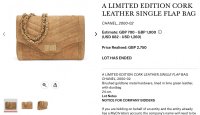A really good topic. And I've read it all with great interest.
There is nothing, actually, to defend killing other beings for their skin. Or even for their...nutritional value. Nothing at all. We try to explain it away and to justify it with a myriad of perfectly reasonable explanations but honestly, if we look very deep down inside, don't our custumer preferences simply make us willing participants in mass slaughter of innocent animals?
Look, I've got lots of leather items (including exotics) so if you see my post as a judgement, it is foremost a judgment on myself. I wish my back bone was a bit stronger to support my actions against my views.
There is nothing, actually, to defend killing other beings for their skin. Or even for their...nutritional value. Nothing at all. We try to explain it away and to justify it with a myriad of perfectly reasonable explanations but honestly, if we look very deep down inside, don't our custumer preferences simply make us willing participants in mass slaughter of innocent animals?
Look, I've got lots of leather items (including exotics) so if you see my post as a judgement, it is foremost a judgment on myself. I wish my back bone was a bit stronger to support my actions against my views.


